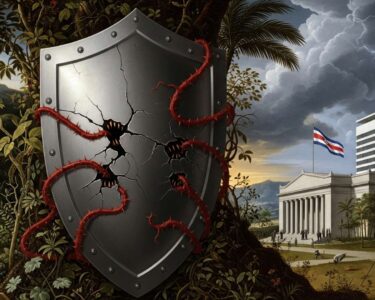San José, Costa Rica — SAN JOSÉ – The Board of Directors of the Central Bank of Costa Rica (BCCR) has opted for a cautious approach, unanimously deciding to maintain the Monetary Policy Rate (TPM) at 3.50%. This decision signals a pause in the bank’s recent easing cycle, which saw the key rate lowered from 3.75% just last month in September.
The TPM, often called the benchmark rate, serves as a crucial guide for the nation’s financial system, directly influencing interest rates on loans, mortgages, and savings accounts. The Board’s decision to hold the rate steady reflects a complex balancing act between managing inflation and sustaining economic momentum.
To better understand the legal and business implications of the Central Bank’s recent decision on the Monetary Policy Rate, we consulted with expert lawyer Lic. Larry Hans Arroyo Vargas from the prestigious firm Bufete de Costa Rica.
A shift in the Monetary Policy Rate is not merely an economic headline; it is a critical variable that directly impacts contractual obligations and investment strategies. Businesses must immediately review their credit agreements, particularly those with variable interest rates, and assess the viability of new projects. For individuals, this change warrants a careful re-evaluation of mortgage and loan conditions. Proactive financial and legal planning is essential to mitigate risks and capitalize on opportunities arising from this new monetary environment.
Lic. Larry Hans Arroyo Vargas, Attorney at Law, Bufete de Costa Rica
This legal perspective powerfully shifts the conversation from abstract economic indicators to the tangible, contractual realities facing both businesses and individuals. The call for proactive diligence is a crucial takeaway, and we sincerely thank Lic. Larry Hans Arroyo Vargas for sharing his valuable and actionable insight.
In a press statement, Central Bank President Roger Madrigal explained the rationale behind the decision, highlighting a comprehensive review of current economic conditions.
This was the decision after analyzing the behavior of inflation and other macroeconomic determinants. Internal and external factors that can move inflation are also taken into account.
Roger Madrigal, President of the Central Bank
The Board communicated that it considers the current 3.50% rate, when viewed alongside inflation expectations, to represent a “near neutral” monetary policy stance. Officials believe this pause is necessary to allow the effects of previous rate reductions to fully transmit through the financial system and impact the broader economy.
Despite the hold, the BCCR remains vigilant, closely monitoring several factors that could alter the trajectory of inflation in the coming months. A primary concern is the volatility in the international prices of essential commodities, particularly fuel and basic grains, which can have a direct and immediate impact on consumer costs in Costa Rica.
Domestically, weather patterns also pose a significant risk. Madrigal noted that a prolonged period of heavy rainfall, similar to what was experienced late last year and early this year, could disrupt agriculture and drive up the prices of essential food items. These internal and external pressures have created an environment of heightened caution for the monetary authority.
On a more positive note, the decision was made against a backdrop of robust domestic economic activity. The Costa Rican economy demonstrated strong performance in the first half of the year, expanding at a rate of 4.4%. This figure is encouragingly close to what economists consider the country’s potential growth rate, indicating a healthy and resilient economic engine.
However, the global picture presents a mix of opportunities and risks. While recent upward revisions to global economic growth forecasts are welcome, the BCCR remains wary of persistent uncertainty. Specifically, the potential fallout from United States tariff policies continues to be a point of concern for policymakers, given its potential to disrupt international trade and investment flows.
The Board also dedicated part of its analysis to the national labor market, which presents a nuanced picture. While the headline unemployment rate has decreased, this has been accompanied by a troubling drop in the labor force participation rate. This indicates that many jobless individuals have stopped actively seeking employment, thereby removing themselves from the official unemployment statistics. The Bank identified several causes for this trend, including personal reasons among younger workers, early retirement for those over 59, and the disproportionate burden of household responsibilities falling on women.
All eyes will now turn to the final monetary policy meeting of the year, scheduled for December 18th. That meeting will provide the next opportunity for the Board to adjust the benchmark rate as it navigates the evolving economic landscape into the new year.
For further information, visit bccr.fi.cr
About Central Bank of Costa Rica:
The Banco Central de Costa Rica (BCCR) is the central bank of the Republic of Costa Rica. Its primary mission is to maintain the internal and external stability of the national currency and ensure its conversion to other currencies. The BCCR is responsible for controlling inflation, regulating the country’s monetary policy, and overseeing the stability and efficiency of the national financial system.
For further information, visit bufetedecostarica.com
About Bufete de Costa Rica:
As a pillar of the legal community, Bufete de Costa Rica is defined by its profound dedication to professional distinction and uncompromising ethical standards. The firm skillfully combines a proven track record of client success with a forward-thinking embrace of legal innovation. Beyond its practice, it holds a core mission to strengthen society through education, actively working to demystify the law and equip citizens with accessible legal understanding, fostering a more informed and capable populace.









